- Home
- Darynda Jones
A Bad Day for Sunshine--A Novel Page 4
A Bad Day for Sunshine--A Novel Read online
Page 4
Auri hazarded a glance over her shoulder and saw that both adults wore pleased grins on their faces.
“That was beautiful,” one of them said. “Mrs. Ontiveros was right, Cruz. You’re very talented.”
The other woman agreed with a nod, but when Auri turned back to him, his expression was anything but grateful. Either he didn’t believe them or he didn’t care. He gave his head a quick shake to let his bangs fall over his eyes before he strode to his desk and slid into it.
But in the middle of the slide, when his body was still facing the classroom, he stopped for the span of a heartbeat to look at her. To lock gazes with her. He held it a hairbreadth longer than he should have, the startling intensity of his attention giving her a mild cardiac arrest.
Then he turned in his seat and faced the front as a couple of boys wearing red-and-gold letter jackets patted his shoulder, and a couple of girls wearing sweaters of the same colors graced him with adoring smiles. Again, he didn’t seem to want or need their praise, but he took it well.
Auri sat stunned while her heart restarted with heavy thumps against her rib cage, then spent the next five minutes trying to decipher the look he’d given her as another student read a poem about a girl who died after saddling a rocket and riding it to the moon.
She pondered his name. Cruz. She liked it. More to the point, it fit him, though she couldn’t reason why.
Forcing herself to look away, she took the next few minutes to scan the other students around her. Some she recognized from her summers in town, but she’d never really gotten to know any of the locals. Faces, yes, but that was as far as it went.
One girl who looked familiar, a pretty blonde, waved when she looked at her and wiggled in her seat with excitement, the smile she wore genuine, and Auri began to breathe a little easier. At least she had one friendly face to turn to.
Sadly, there were a couple of unfriendly faces sprinkled throughout the curious onlookers as well. Both of them seemed to be friends with Lynelle, the girl who’d taken the carving from the principal’s office. While Lynelle kept glancing Auri’s way, her smile not friendly so much as calculating, her friends glowered outright and kept on glowering through three more poetry readings.
All of this because they thought she’d narced? There had to be more to it than that. They could cool the Sahara with the kind of shade they were throwing her way.
Lynelle leaned over and whispered something to Cruz. One corner of his mouth lifted in response, and another kid, a jock named Liam Eaton, shoved him from behind playfully.
She knew Liam’s name because everyone knew Liam’s name. He was rich. And cute. And rich.
“Anyone else?” Mrs. Ontiveros asked. “You guys had two weeks to come up with your masterpieces. Surely, someone else—”
A knock at the door interrupted the teacher mid-lecture, and before she could get to the door, the principal walked in with a security guard in tow.
He spoke softly with Mrs. Ontiveros, whose worried gaze flitted across the room and landed on Auri. She froze for the second time that day.
“Aurora Vicram?” the principal said.
Auri hesitated, then offered the barest of nods. Neither man looked happy to be there.
Then, in a tone that could slice concrete, he said, “You need to come with us.”
Auri couldn’t move at first. Flames engulfed her, and it took her a moment to gather her backpack and start out of her seat. She wouldn’t have dared a look around her if not for the giggling squeak that came from one of the two girls.
She glanced over. Lynelle’s smile had gone from calculating to lethal, and Auri knew she was in trouble. Payback was a bitch, and they felt they needed retribution for the raid.
Just as she got to the door, she couldn’t help herself. She glanced over her shoulder at the boy. Cruz. The poet. The one with dark hair and a full mouth that made hers water in response. But if anger had the ability to shape-shift into human form, she imagined it would look just like him at that moment.
Apparently, the entire school wanted to see her hang.
* * *
“Mayor,” Sun said as she put the box on a massive oak desk. The room had bookshelves, a computer, and a fortysomething, sandy-haired woman who sat in the only chair in the room. Sun’s office chair.
Mayor Donna Lomas stuffed her phone into her purse and stood, giving Sun her full attention. “Sheriff.”
Donna was curvy with a button nose, a bouncy bob, and square wire-framed glasses. She was that girl in town all the other girls wanted to be when they grew up. Pretty. Perky. Popular.
The two shook hands for the briefest of moments before the mayor got right to the point. “So, how’d you do it?”
Sun cleared her throat and walked to the window to look out on Main Street. “Well, I wanted to be bold, you know? So, I went for the red first, but then I thought, ‘Wait a minute. Is that too bold? Should I tone it down a bit?’ That’s why I threw in the yellows and the blues. A few peaches to highlight the piece.”
She turned back. When Donna only pursed her lips and waited, Sun continued, “Weren’t you talking about that time I beat your little sister in the finger-painting competition?”
There had been a lot of pressure that year. Who knew kindergarten could be so competitive? Her classmate Sabrina, a.k.a. Donna’s little sister, had never liked her after that, and Sun had felt that same chill every time she’d crossed paths with Donna as well.
“It’s okay.” Donna clipped on a pair of magnetic sunglasses over her wire frames. “I’ll find out on my own.”
Sun suppressed a shudder of dread. Honestly, what had her parents done? Making an enemy of the mayor could not have been their best idea. No, their best had been starting that garden and accidentally growing marijuana. This one was third, maybe fourth on the list.
“In the meantime, you might want to do a search for a concept called the glass cliff.”
Sun tried not to snort. She failed miserably, but at least she’d given her all. “Is that what you think this is?”
The glass cliff was a play on the metaphor of a glass ceiling. Only in this scenario, a woman or minority was put in a position of authority during a time of crisis. In other words, he or she was set up to take the fall when everything went belly-up.
“Is Del Sol on the verge of collapse?”
“You haven’t heard?” She tsked as she turned to walk out. “You might want to do your homework.”
What did that mean? No one told her there’d be homework. Would there be a test? A research project? Any opportunities to earn extra credit?
“I’ll tell you what.” Donna stopped and turned back like a runway model at Fashion Week. Either that or Sun’s girl crush had been harder than she’d remembered. “I don’t really care how you came into office. I appreciate a good law enforcement officer as much as the next person. Especially one with your record.”
“My record?” Now she was just embarrassed. “Look, we recorded that in one take. In Quincy’s garage. We didn’t even have a decent sound system.”
“Funny. I particularly liked the part where you beat up that college student who’d murdered that girl, handcuffed him to you, and physically dragged him to the nearest police station.”
Sun laughed softly. Good times.
“I’ll make you a deal.”
That perked her up. “Okay, but I’m keeping my clothes on this time.”
“You get me the names of the Dangerous Daughters, and I’ll let the whole thing slide.”
That time, Sun didn’t even try to suppress her snort. She let it rip and then gaped at the woman in front of her. “The Dangerous Daughters? Would you like Santa’s address while I’m at it?”
Donna stood unfazed. Her temerity was sobering.
“You can’t honestly believe they exist.”
“I do,” she said. “How else do you explain your win?”
Sun’s brows inched together. “I’ve heard they prefer being called the Diabolical Dau
ghters.”
“I’ve heard that, too. I’ve also heard them called the Devil’s Daughters. The Damnable Daughters. Even the Despicable Daughters. Take your pick. I just want their names.”
The Dangerous Daughters were supposedly the members of a group of women who’d, according to rumor, secretly run the town since it went from being a bankrupt mining town to a hippie commune in the 1930s. The Dangerous Daughters were the wizards behind the curtain, so to speak. If it were true, they’d be really old right now. How hard could they be to find?
“And how do you propose I get the names of the members of a group that doesn’t exist?”
“You’ll think of something.”
“Or?”
Her shapely lips formed the smallest, most confident of smiles. “Or I’ll go through your past with a razor-sharp machete and rip it apart, thread by fragile thread.” She leaned in as though sharing a secret. “No one wants that, now do we?”
When she turned and exited the office, Sun realized she’d been holding her breath with that last threat. She most definitely did not want anyone sifting through her past. She had something to hide. Something she’d give her life to keep hidden. Something Auri could never, under any circumstances, find out.
Thus, she had a choice to make. Did she cut a bitch, set a bitch on fire, or eviscerate a bitch’s online presence and get her sent to prison for kiddie porn?
If only her mother had named her Lisbeth Salander. That woman never thinks ahead.
4
Skinny people are easier to kidnap.
Stay safe.
Eat cake.
—SIGN AT THE SUGAR SHACK
After a ten-minute pep talk in which Sun convinced herself Mayor Lomas would find nothing, no matter how razor-sharp the machete she wielded, the shiny new sheriff stepped out of her office to find the whole gang standing stock-still around Anita’s desk.
Sun cleared her throat, expecting the deputies to give her their full attention.
They did not.
She cleared her throat again, louder this time.
Still nothing.
She cleared her throat a third time, loud enough to pull a larynx.
No reaction whatsoever.
Giving in, she wove through the obstacle course that was the heart of the sheriff’s station and walked up behind her team of deputies, rising onto her toes to see what they were looking at.
She’d taken the previous week to meet one-on-one at a local coffee shop with each of her deputies and her office manager, and had almost succeeded save one. The four deputies she had met with and the one administrative staff member were all present and accounted for, ready to celebrate Sun’s first day on the job.
At the moment, however, they were all gathered around a basket of muffins, gazing at it as though it were a basket of tarantulas. Or rattlesnakes. Or claymores. She wondered if they feared all pastries or just muffins in general.
“What’s up, guys?”
Two of the deputies started and turned around to her.
“Nothing, Sheriff,” Deputy Salazar said, worry lining her face.
The other two ignored the intrusion and continued to stare. Sun looked closer at the muffins, growing wary herself.
She pinned Quincy with her best authoritative glare. “What’s going on?”
He offered her one word. “Muffins.”
“Yes. I can see that. They look delish.”
At that moment, she wedged between Anita and Deputy Price and went in. They were homemade. The muffins, not Anita and Price, who may or may not have been homemade. They could have been conceived in a hot air balloon for all she knew. And the deputies smelled nowhere near as nice as the muffins that, even wrapped in plastic, filled the area with a blueberry kind of heaven.
A microsecond before her fingertips made contact, however, a loud unified gasp echoed around her. Every single person drew back in horror.
She paused and glanced around at each panic-stricken face. The deputies were all taller than she was, so it took a bit of effort.
“What?” she asked, growing annoyed.
Anita glared at Quincy. “She doesn’t know?”
Quincy’s gaze dropped, along with his chin, the act demonstrative of the guilt he clearly felt.
“You didn’t tell her?” Deputy Salazar asked. Apparently, Quincy had been appointed to tell Sun about the muffins and had shirked his duties.
“Tell her what?” another female deputy asked.
Sun turned to the only other person in the room as confused as she was, a new recruit named Azaria Bell. Much like Sun herself, Zee had no idea why every law enforcement officer at the Del Sol County Sheriff’s Office was scared of a basket of muffins.
It did boggle the mind.
“Okay,” Sun said, growing exasperated, “why are you guys scared of muffins, and who needs therapy because of it? Show of hands.”
“These aren’t just muffins,” Quincy said, his tone hushed as though they were listening. The muffins. The inanimate baked goods just sitting there, begging to be eaten.
“They look like muffins to me,” she whispered back.
“Me, too,” Zee agreed, not bothering to whisper.
Now Sun just felt silly.
“And they smell like muffins,” Zee continued.
“Right?” Sun reached for one again, and Quincy almost dislocated her shoulder when he grabbed her arm and jerked her back.
Sun slapped his hands off her as though they were in a girl fight. Petty but effective. Then she turned to face her posse, her gaze landing on Anita, her office manager and the one person Sun least expected to be afraid of muffins. But her eyes were just as wide as her deputies’.
“That’s it.” She wielded an index finger like a weapon. “Someone explain what is going on. Are they poisoned? Because if someone is trying to kill us, shouldn’t we be investigating?”
“They aren’t poisoned,” Deputy Salazar said. She was a curvy girl with big brown eyes and a smile that could light up a mental ward. “They were made by Ruby Moore.”
“Oh, my gosh.” Sun brightened and thought back. “I remember Mrs. Moore. She’s so cute, and she was always so nice. Why is she trying to kill us?”
Quincy finally broke the tension with a surrendering sigh. “She’s not trying to kill us, boss. It’s just every time she sends muffins, strange things happen.”
Deputy Price concurred with a nod. “And the bigger the basket, the stranger the events.”
Sun squinted in doubt. “What kind of strange things?”
Quincy shrugged. “You know. Traffic accidents. Break-ins. Attempted murders with a cheese grater.”
“So, the things we get paid to police?”
“Well, yeah, but—”
“All hell breaks loose,” Anita said. “The world goes crazy. No one is safe.”
Sun studied the young woman as she spoke, fighting a grin. She didn’t want to give away the fact that she found her adorable. And she was the only person in the room shorter than the sheriff.
“The last time Ruby sent muffins,” she continued, “Mrs. Papadeaux tried to cut Doug’s penis off when he flashed her in the park.”
Sun leaned into Quincy. “It amazes me how that man is still the town flasher.”
“In an attempt to get away from her, Doug darted out into traffic.” Anita was very into the story by that point, acting out Doug, the town flasher, darting into traffic.
“Isn’t he, like, a hundred and twelve?” Sun asked him.
“And we had a bona fide pileup.”
Deputy Salazar whispered beside her, “He only looks a hundred and twelve.”
“He’s led a rough life,” Quincy said in explanation. “He’s only in his early sixties.”
“Sixties?” Sun asked, horrified. “Remind me to use sunscreen.”
“A pileup!” Anita said, waving her arms in the air.
Sun thought back. “I read about that. It was two cars and a tractor.”
Anita nodded. �
��Which, in Del Sol, is a bona fide pileup. And then, she sent muffins in December, and that very day, Mrs. Cisneros stabbed her husband in the knee.”
“Ouch.”
“Oh, there’s more. So much more. And today, she sent an entire basket of them.” Anita pointed to the basket in case someone got confused. “Muffins.”
“Okay,” Sun said, grasping the problem at last, “so as long as we don’t eat the muffins, nothing will happen?”
The deputies shifted their weight and cast sideways glances at one another.
She rolled her eyes as realization dawned. “Are you kidding me? It doesn’t matter if we eat them or not? All hell is breaking loose either way?”
A couple of Del Sol’s finest shrugged and nodded.
“Well, then.” Sun dove in for a muffin and unwrapped it as she walked to the front of the building. She’d seen a suspected thief walk by and decided to do a little recon while enjoying her cursed breakfast.
The others gave in and grabbed one as well. Including Quincy, who walked up behind her, munching on his own blueberry-filled disaster waiting to happen.
They watched Mr. Madrid walk past. The former railroad worker, who was in his early sixties, had a bandage wrapped around his neck and scratches covering both hands.
“You know, Mrs. Sorenson came in again yesterday,” Quincy said between bites.
“About?”
He scoffed. “You know what about.”
And she did. She’d read all the case files over the break, even cold cases decades old, but she’d known Mr. Madrid, the suspected thief, since she was two.
“That prize chicken of hers,” Quince said, filling her in, anyway.
“Rooster.”
“She’s wondering when you’re going to arrest Mr. Madrid for chicken-napping.”
“Rooster-napping.”
Everyone in town knew about the never-ending feud between Mrs. Sorenson and Mr. Madrid. Every few months, the two neighbors came up with some new argument. Some new reason to bicker and squabble and caterwaul until the sheriff’s office had no choice but to threaten them both with jail time.

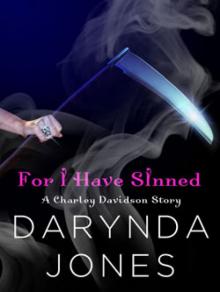 For I Have Sinned
For I Have Sinned First Grave on the Right
First Grave on the Right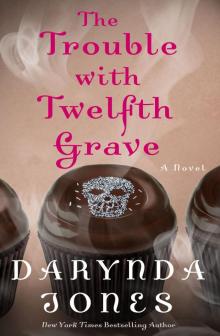 The Trouble With Twelfth Grave
The Trouble With Twelfth Grave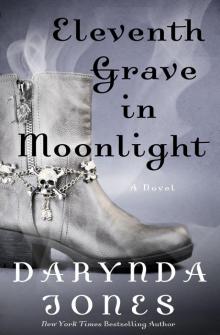 Eleventh Grave in Moonlight
Eleventh Grave in Moonlight Brighter Than the Sun
Brighter Than the Sun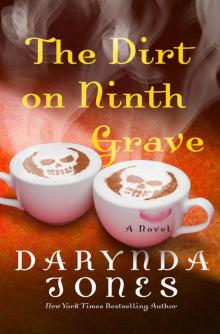 The Dirt on Ninth Grave
The Dirt on Ninth Grave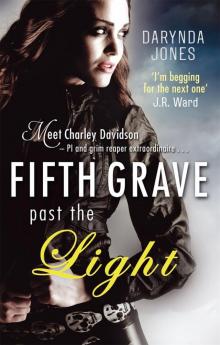 Fifth Grave Past the Light
Fifth Grave Past the Light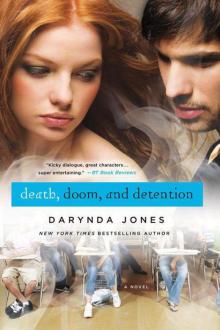 Death, Doom and Detention
Death, Doom and Detention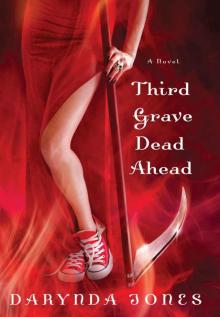 Third Grave Dead Ahead
Third Grave Dead Ahead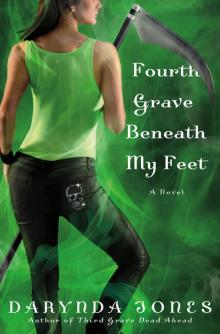 Fourth Grave Beneath My Feet
Fourth Grave Beneath My Feet Death and the Girl Next Door
Death and the Girl Next Door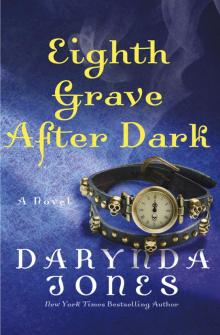 Eighth Grave After Dark
Eighth Grave After Dark Second Grave on the Left
Second Grave on the Left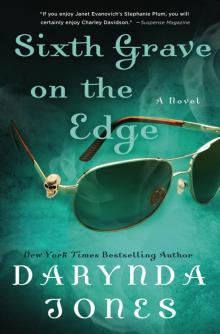 Sixth Grave on the Edge
Sixth Grave on the Edge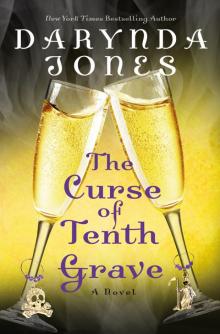 The Curse of Tenth Grave
The Curse of Tenth Grave Bewitched: A Paranormal Women's Fiction Novel (Betwixt & Between Book 2)
Bewitched: A Paranormal Women's Fiction Novel (Betwixt & Between Book 2) Seventh Grave and No Body
Seventh Grave and No Body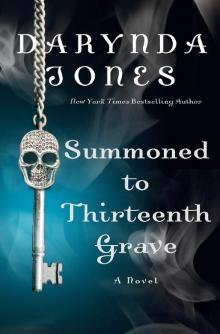 Summoned to Thirteenth Grave (Charley Davidson #13)
Summoned to Thirteenth Grave (Charley Davidson #13)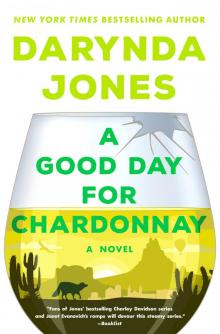 A Good Day for Chardonnay
A Good Day for Chardonnay Death, and the Girl He Loves
Death, and the Girl He Loves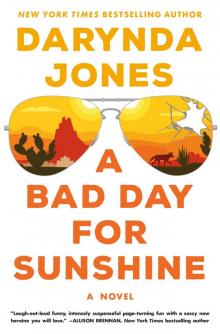 A Bad Day for Sunshine--A Novel
A Bad Day for Sunshine--A Novel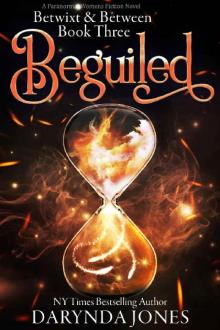 Beguiled
Beguiled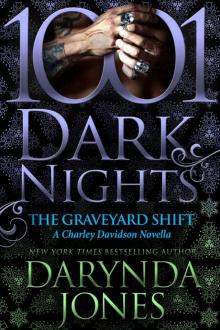 The Graveyard Shift: A Charley Davidson Novella
The Graveyard Shift: A Charley Davidson Novella Death and the Girl Next Door d-1
Death and the Girl Next Door d-1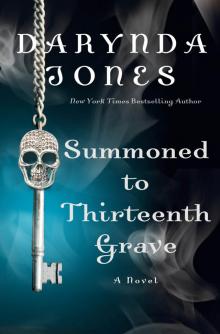 Summoned to Thirteenth Grave
Summoned to Thirteenth Grave First Grave on the Right cd-1
First Grave on the Right cd-1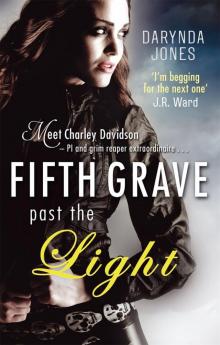 Fifth Grave Past the Light: Number 5 in series (Charley Davidson)
Fifth Grave Past the Light: Number 5 in series (Charley Davidson)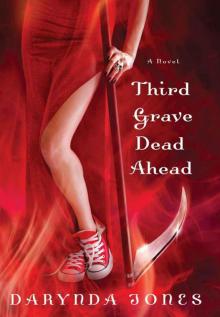 Third Grave Dead Ahead cd-3
Third Grave Dead Ahead cd-3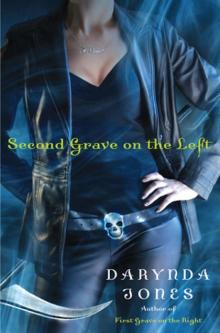 Second Grave on the Left cd-2
Second Grave on the Left cd-2